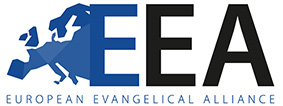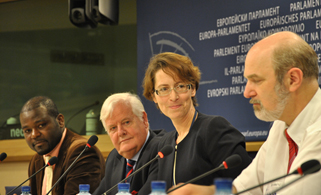Could you kindly tell us who you are and what your background is?
My name is Behnan Konutgan. I’m from the East of Turkey and I am of Syriac Orthodox Christian background. I come from a Christian heritage. I studied literature and sociology and worked as a teacher for three years in a high school. From the early 1980s onwards, I worked for the Bible Society in Turkey and was involved in many different projects including translating the Bible into the modern Turkish language. I speak seven different languages and master Hebrew as well. I helped as well with the translation of the Kurdish Kurmanji Bible.
Could you please explain to us the characteristics of the diaspora church in Turkey and what differentiates it from diaspora churches in other European countries?
Turkey already had a diaspora community over 2.000 years ago. Antiochus deported 10.000 Jews into Anatolia in Turkey. That’s why in the ancient Sardes (at the location of modern Sart, near Salihli, in Turkey’s Manisa Province) there was the largest and biggest Synagogue in the whole of Turkey. Since 1979, when Khomeini took over in Iran, many refugees have come to Turkey. They came into contact with Turkish Christians and many became believers. Today there are more than 50 Iranian churches in Turkey, some of them very large. Some years ago, the Yazidis were persecuted by the Kurds (and later by IS) and fled into Turkey. The Turkish church helped them a lot. One day the Turkish Evangelical Alliance had a meeting in Istanbul and suddenly a Yazidi delegation of people appeared. I do not know how they got to know about our meeting. They said to us: “You Christians helped us a lot, but we have not only physical needs. Can you give us teachers for our spiritual needs?”
Through the war in Syria yet again hundreds of thousands of refugees came to Turkey. We visited the camps and gained trust. This enabled us to pass on Kurdish and Arab New Testaments. As most of the Kurdish Syrians had their education in Arabic, this was their preferred language. People started to follow Jesus and formed fellowships. There are around 15 Kurdish and Arab speaking fellowships in Istanbul alone. As Turkish churches we register these under our legal name. They are really growing in numbers and in their faith. Turkish churches are very open and helpful to these new fellowships. This is true in various cities where these new churches are present.
What are some current numbers, facts and figures about the Turkish diaspora church in Europe that believers across Europe should know?
After 1980 there was a continuous trickle of Turkish believers who left the country for various reasons. They formed Turkish churches mostly in Germany, the Netherlands, Belgium, and Sweden. The exact numbers are not really known but there are over 1.000 Turkish believers plus many Turkish speaking ones from Bulgaria, the Gagauz area (Southern Moldova) and some other places. There are over 50.000 Turkish believers with Bulgarian background all over Europe. Their pastors are mostly uneducated as was revealed in a meeting we had with them three years ago. Therefore, we opened a theological school for them to change this.
In which way does the Turkish diaspora church in Europe bring new aspects and blessings to the European church landscape as a whole and the church landscape in different countries?
Europeans should know that believers coming from Turkey are really faithful. They might not be that well read in theology, but they are vivid readers of the Bible and they are evangelizing. They concentrate on the people of their own background, Turkish speakers or Kurdish-speaking Alevis. And these groups are growing in numbers.
Which mistakes has the Turkish diaspora church made in the past when planting churches across Europe and building the Kingdom of God? Which lessons have been learned?
The Turkish diaspora church has made the experience that the official German church does not care. The Evangelical churches give them space for worship and there is at least a relationship. When we build the Kingdom of God we should not focus on our background and our nationality. Unfortunately, this is often not the case even among Turkish believers with different nationalities. Bulgarian brothers complain that they are despised by their Turkish brothers. This is not good. We need to learn the lesson that we are all united in Jesus and loved and cherished by him alike.
How would you characterize the spiritual state of Europe as a continent and what particular challenges stand out for Turkish diaspora believers?
As a Turkish Christian I feel really sorry that so many traditional churches are quite empty with little attendance of their services. Own personal needs seem to be more important to people than the Bible. Furthermore, the public opinion seems to be more important than the teachings of Jesus Christ. This is affecting Turkish Christians, too. Finding lively churches would help them a lot. Another issue is that European Christians hardly ever invite their Turkish brothers and sisters into their homes. Unfortunately, this is true at the workplace, in daily encounters, and in the church setting. Building relationships would be building their faith as well.
From your perspective, what are currently the biggest hurdles for the proclamation of the Gospel and the building of the Kingdom of God in Europe?
There are no obvious obstacles for the proclamation of the gospel in Europe. Europe is very free. In Turkey there is not the same freedom. Of course, there are some very resistant people in Europe like atheists. Also, when talking with people in their 50ies and 60ies in Europe, for the most part they are resistant to the gospel. But the young people are open. This is a big chance for the gospel.
In three sentences: What is your vision for the Kingdom of God in Europe?
I believe that the Lord – when all the church is united and prays together – will send revival. This will happen to the Turks, the Kurds, the Arabs, and others. It will happen in the church first and then it will spread to other people outside the church. When God’s people are ready, the people who do not know him will become ready as well.
The interview was conducted by Thomas Bucher, General Secretary of the European Evangelical Alliance, during the EEA Balkans Meeting in Istanbul, Turkey in early September 2022.












